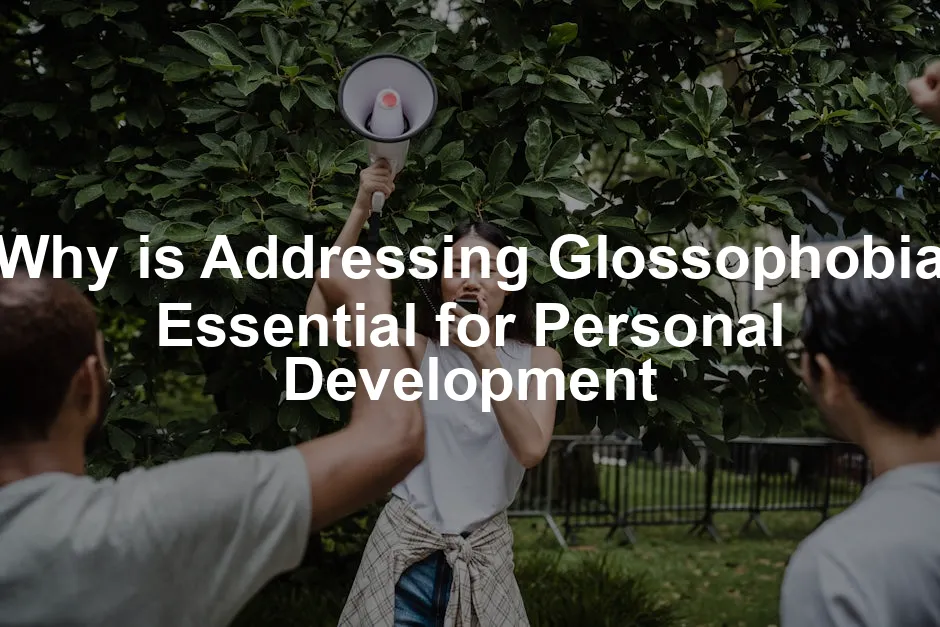
Why is Addressing Glossophobia Essential for Personal Development
Introduction
In a world where communication is key to success, glossophobia—an intense fear of public speaking—can feel like a ticking time bomb waiting to explode. Imagine standing in front of an audience, palms sweaty, heart racing, all while your mind plays a relentless loop of “What ifs.” This crippling fear doesn’t just hinder your ability to speak; it can stall your personal development, career progression, and even your social interactions. But don’t despair! Addressing glossophobia is not merely about overcoming fear; it’s about unlocking doors to unparalleled growth and opportunity. Studies show that a staggering 75% of people experience anxiety related to public speaking, with many avoiding opportunities due to this fear. This avoidance can lead to a lack of essential skills and missed chances for personal growth. Overcoming glossophobia can transform your life, allowing you to express thoughts clearly, engage in meaningful conversations, and advance your career.
But how do you begin this journey? Tackling glossophobia involves understanding its roots, acknowledging your fears, and embracing strategies to overcome them. From joining supportive communities like Toastmasters International Membership Kit to practicing visualization techniques, the path to conquering this fear is filled with opportunities. In this article, we will explore why tackling this fear is crucial for personal development, equipping you with the tools and insights needed to transform your anxiety into confidence.Understanding the fear of public speaking is crucial for personal development. Why do some people have a fear of public speaking (glossophobia)
Summary
Glossophobia is not just a quirky fear; it’s a pervasive issue that affects a staggering number of individuals across various demographics. From students to seasoned professionals, the implications of glossophobia extend far beyond mere discomfort; they can lead to missed opportunities, stunted career advancement, and social isolation. This article delves into the multifaceted reasons why addressing glossophobia is vital for personal development. We’ll explore the psychological effects of glossophobia, including the erosion of self-confidence and the tendency to shy away from challenges. Additionally, we’ll discuss how this fear can hinder career growth, limiting the ability to showcase skills and leadership potential. The article will highlight effective strategies for overcoming glossophobia, such as cognitive-behavioral techniques, gradual exposure, and the importance of supportive communities like Toastmasters. By the end, you will not only understand the importance of addressing glossophobia but also feel empowered to take actionable steps towards conquering this fear. Whether it’s delivering a presentation at work, engaging in meaningful conversations, or simply expressing your thoughts in social settings, overcoming glossophobia opens the door to personal growth, enriching your life in ways you never thought possible.
Understanding Glossophobia
Glossophobia, often known as the fear of public speaking, is a widespread anxiety disorder. It’s not just about feeling nervous—it’s an intense fear that can strike at the mere thought of addressing an audience. The symptoms can be overwhelming. People often experience sweating, shaking, rapid heartbeat, and even nausea. These physical manifestations can be so severe that they prevent individuals from effectively communicating their thoughts or ideas during crucial moments. Statistics reveal that glossophobia affects approximately 75% of people to some degree. This fear ranks among the highest of all social anxieties, alongside heights and spiders! For many, the anxiety associated with public speaking can be debilitating, leading to avoidance of social situations that require speaking in front of others. In fact, studies show that nearly 45% of individuals report that their fear of public speaking has impacted their career choices.

In the end, acknowledging the impact of glossophobia on one’s life is the first step toward reclaiming confidence in public speaking. With the right support and techniques, individuals can transform their anxiety into a powerful tool for personal growth and effective communication. To aid in this journey, consider exploring Public Speaking for Dummies, a great resource to help you navigate the ins and outs of effective communication.Recognizing the importance of effective communication is vital in overcoming glossophobia. Why does effective communication matter in overcoming glossophobia
The Impact of Glossophobia on Personal Development
Erosion of Self-Confidence
Glossophobia can significantly erode self-confidence. When individuals constantly question their abilities, it leads to a cycle of self-doubt. This lack of confidence often causes them to shy away from challenges. The fear of speaking up can be so crippling that it transforms into avoidance behaviors. People may skip meetings, decline invitations to share their ideas, or even withdraw from social situations altogether. These behaviors, while providing temporary relief, ultimately contribute to a sense of social isolation. This isolation can further exacerbate feelings of loneliness and depression, creating a vicious cycle that is hard to break.
Missed Opportunities
The ramifications of glossophobia extend beyond personal feelings of inadequacy; they also manifest in missed opportunities. In professional environments, effective communication is crucial. When individuals avoid public speaking due to their fears, they limit their career advancement. For example, many people hesitate to apply for leadership positions simply because they require presentations to senior management. This fear can also hinder academic performance, particularly for students in disciplines where oral presentations are a core requirement. Students with glossophobia might underperform in classes that value public speaking, missing out on opportunities to showcase their knowledge and skills. To enhance your public speaking skills, consider reading The Art of Public Speaking by Dale Carnegie, a classic that offers timeless insights into effective communication.
Psychological and Emotional Consequences
The psychological consequences of prolonged glossophobia are profound. It can lead to heightened anxiety and even depression. The constant stress of avoiding public speaking situations can create a sense of dread, further reinforcing negative self-beliefs. Many individuals develop maladaptive coping strategies, such as procrastination or avoidance, which only serve to escalate their fears. These coping mechanisms can have long-term effects, making it increasingly challenging to engage in public speaking situations. Over time, individuals may find themselves in a position where they feel utterly unequipped to handle necessary speaking engagements, whether in personal or professional contexts. This sense of helplessness can be demoralizing, contributing to a lower quality of life. To combat this, consider using a Digital Voice Recorder to practice your speeches and monitor your progress.
Overcoming Glossophobia: Strategies for Success
Cognitive-Behavioral Techniques
Thought Restructuring It’s time to flip the script on those pesky negative thoughts. Instead of saying, “I’ll embarrass myself,” try, “I have valuable insights to share.” This simple shift can transform your public speaking experience. Cognitive-behavioral techniques focus on identifying and challenging those anxious thoughts. By replacing them with constructive ideas, you can significantly reduce your anxiety levels. Remember, the audience is rooting for you, not waiting to judge your every word. To further enhance your skills, consider picking up The Quick and Easy Way to Effective Speaking by Dale Carnegie, which provides practical advice to help you shine.
Practical Tips for Public Speaking
Preparation Preparation is your best friend. Familiarize yourself with your topic inside and out. Create a clear outline and rehearse multiple times. When you know your material well, nervousness evaporates. Practice in front of friends or record yourself. This not only boosts your confidence but also helps you refine your delivery. Consider using a Presentation Remote Clicker to enhance your presentation experience.

Supportive Communities and Resources
Toastmasters Joining a public speaking club like Toastmasters can be a game changer. These supportive environments offer constructive feedback and allow you to practice in front of an encouraging audience. You’ll learn the ins and outs of effective communication while building a network of fellow speakers. Plus, you’ll find that many members share similar fears, offering camaraderie on your journey. For additional guidance, consider investing in TED Talks: The Official TED Guide to Public Speaking, which is filled with insights and tips from some of the best speakers in the world.

Real-Life Success Stories
Case Studies Let’s take a moment to celebrate the triumphs of those who once struggled with glossophobia. Take Anna, a marketing graduate who feared presenting to senior leadership. With the help of a supportive mentor and a Toastmasters membership, she transformed from a timid speaker into a confident presenter. Today, she delivers impactful pitches that captivate her audience.

Conclusion
In conclusion, addressing glossophobia is more than just conquering a fear; it’s a pivotal step in personal development. The process of tackling this fear can result in strengthened self-confidence and refined communication skills. These benefits can lead to an abundance of opportunities in both personal and professional arenas. As you embark on this transformative journey, keep in mind that overcoming glossophobia is a gradual endeavor—one that demands persistence, practice, and a little bit of support.
FAQs
What is glossophobia?
Glossophobia is the intense fear of public speaking. It can manifest through various symptoms, including excessive sweating, shaking, a racing heartbeat, and difficulty breathing. For some, just the thought of speaking in front of an audience triggers anxiety. This fear can severely impact daily life, hindering one’s ability to express thoughts clearly. Whether it’s a small meeting or a large presentation, the fear can lead to avoidance and missed opportunities, making effective communication seem like an insurmountable challenge.
How common is glossophobia?
Glossophobia is surprisingly prevalent—about 75% of people experience some level of anxiety related to public speaking. Among those, around 10% suffer from severe glossophobia. This fear spans various demographics, affecting students, professionals, and even seasoned speakers. It can influence career choices, as many avoid roles that require public speaking. The fear’s widespread nature highlights its significance, indicating that addressing it can lead to improved personal and professional growth.
What are the psychological effects of glossophobia?
The psychological impact of glossophobia is profound. Individuals often experience diminished self-esteem and heightened self-doubt. This fear creates a cycle of avoidance, where the prospect of public speaking becomes so daunting that individuals withdraw from situations that require it. Over time, this can lead to social isolation, as the fear restricts participation in gatherings or discussions. The emotional toll can result in anxiety, depression, and a sense of helplessness, further complicating personal and professional relationships.
Can glossophobia be treated?
Yes, glossophobia is treatable through various methods. Cognitive-behavioral therapy (CBT) is a highly effective intervention that helps individuals confront irrational fears and reshape negative thought patterns. Additionally, support groups like Toastmasters offer a nurturing environment for practice and feedback. Other options include communication skills training, relaxation techniques, and, in some cases, medication to alleviate anxiety symptoms. Seeking professional help can guide individuals toward personalized strategies for overcoming their fear.
What practical steps can I take to overcome glossophobia?
To tackle glossophobia, start with preparation. Knowing your material inside and out can boost confidence. Practice delivering your speech multiple times in a comfortable setting. Gradual exposure is another effective strategy; begin with small groups before moving to larger audiences. Incorporate relaxation techniques, like deep breathing, to manage anxiety. Joining public speaking clubs can provide supportive feedback and practice opportunities. Lastly, remember that everyone makes mistakes, so view them as learning experiences rather than failures.
Is it normal to feel nervous about public speaking?
Absolutely! Feeling nervous about public speaking is entirely normal. Many experience a rush of anxiety before addressing an audience. However, there’s a significant difference between typical nerves and glossophobia. While some jitters can enhance focus, glossophobia leads to overwhelming fear that can paralyze individuals. Recognizing this distinction is essential. Embracing the commonality of public speaking anxiety can help individuals feel less isolated and more empowered to seek support and strategies for improvement.
All images from Pexels




